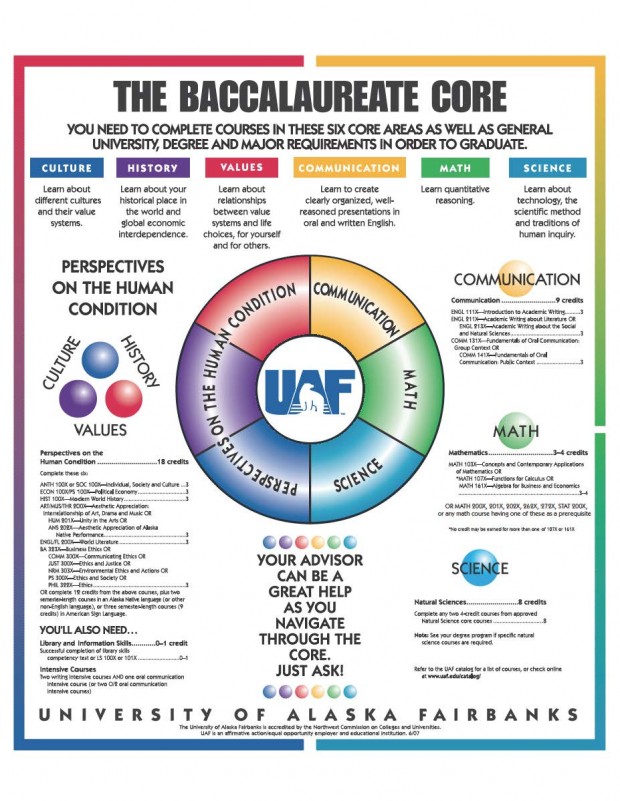UAF requires all baccalaureate students to complete a common set of knowledge in order to be conversant in topics and issues that prepares them for life and model citizenship. Otherwise known as general education, UAF’s Core curriculum is a tightly structured set of requirements covering six (6) main achievements:
- Multidimensional competency in written and oral English
- A solid grasp of quantitative reasoning and mathematical applications
- Intellectual comfort with the sciences
- Appreciation of cultural diversity and its implications for individual and group values, aesthetics and social and political institutions
- Understanding of global economic interdependence, sense of historical consciousness and a more critical comprehension of literature and the arts
- Better understanding of one’s own values, other value systems and relationships between value systems and life choices
Students in OE, certificate, or associate degree programs do not follow the Core curriculum, but should be apprised of the requirements if they plan on continuing their studies to the baccalaureate degree level. In order to accomplish these achievements, the 38 — 44 credit Core curriculum is structured into five (5) main content areas plus an upper-division communication requirement:
COMMUNICATION (9 credits): Two courses in academic writing and one course in oral communication.
PERSPECTIVES ON THE HUMAN CONDITION (18 – 22 credits): Six courses in individual, society & culture; political economy; modern world history; world literature; aesthetic appreciation or unity in the arts; and ethics. You may substitute 2 courses (12 — 15 credits) in a single Alaska Native language or non-English language; or 3 courses (9 credits) in American sign language.
MATHEMATICS (3 — 4 credits): one course in concepts & contemporary applications of mathematics, functions for calculus, algebra for business & economics, elementary probability & statistics, calculus for business & economics, calculus for life sciences, calculus I, calculus II, or calculus III.
NATURAL SCIENCES (8 credits):Two courses in any combination ofatmospheric sciences, biology, chemistry, geography, geology & geophysics, marine science & limnology, or physics. All Core Natural Sciences courses include a lab.
LIBRARY & INFORMATION RESEARCH (0 — 1 credit):one course in library science or successfully completes the library skills competency test.
Credits from the Core courses other than those used to meet the Mathematics and Natural Sciences requirements may not be used to complete degree, major, or minor requirements.
Core courses have an “X’ designator at the end of the course number (ex. ENGL F111X).A grade of C- (1.7) or higher must be earned for any Core course.
UPPER-DIVISION WRITING & ORAL COMMUNICATION (9 — 12 credits): Two writing-intensive courses designated by a “W’, and one oral communication-intensive course designated “O’, or two oral communication-intensive courses designated “O/2’ after the course number. Some majors include courses that meet this requirement within the major, but some majors do not.
As long as their first degree was from a regionally accredited institution, students who are pursuing a second baccalaureate degree at UAF are considered to have met the requirements of the UAF baccalaureate Core curriculum.
[gview file=”https://advising.community.uaf.edu/wp-content/uploads/sites/369/2014/06/BA-Core-Requirements.tif”]
Core Donut
A graphic representation of the Core curriculum, affectionately called the Core donut, provides a useful visual when explaining the Core requirements to students.





